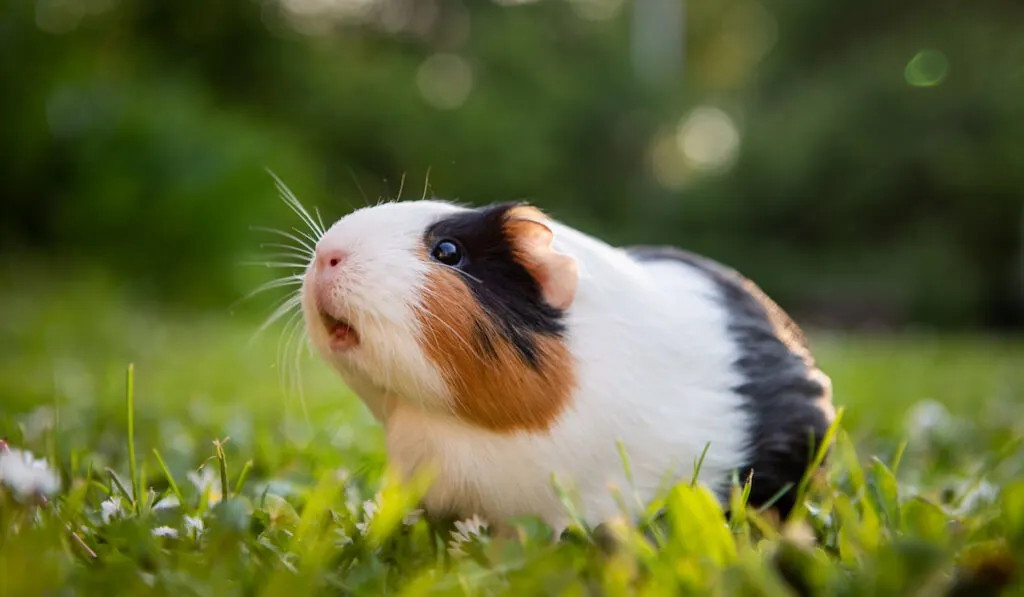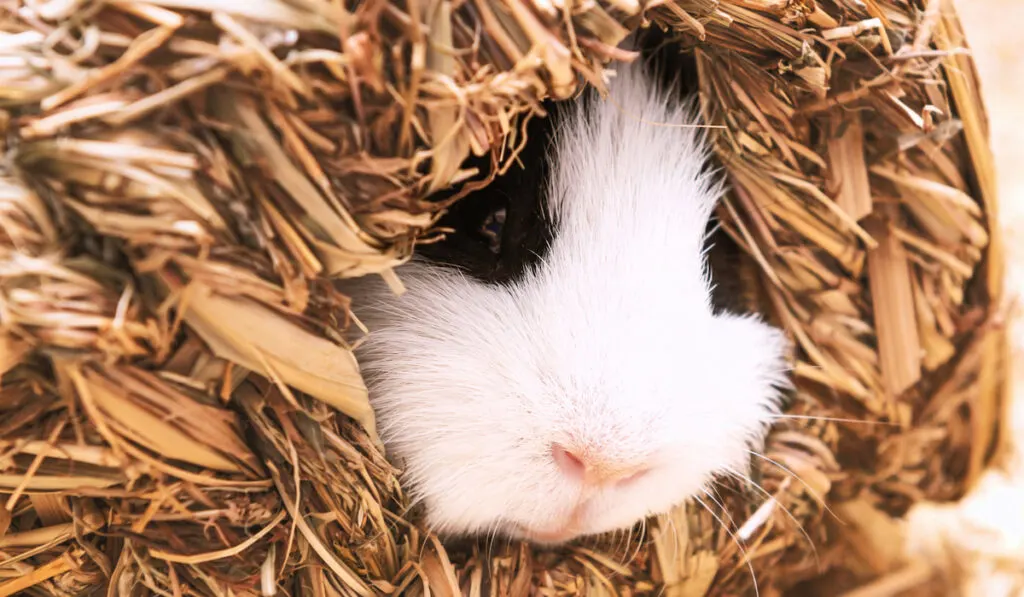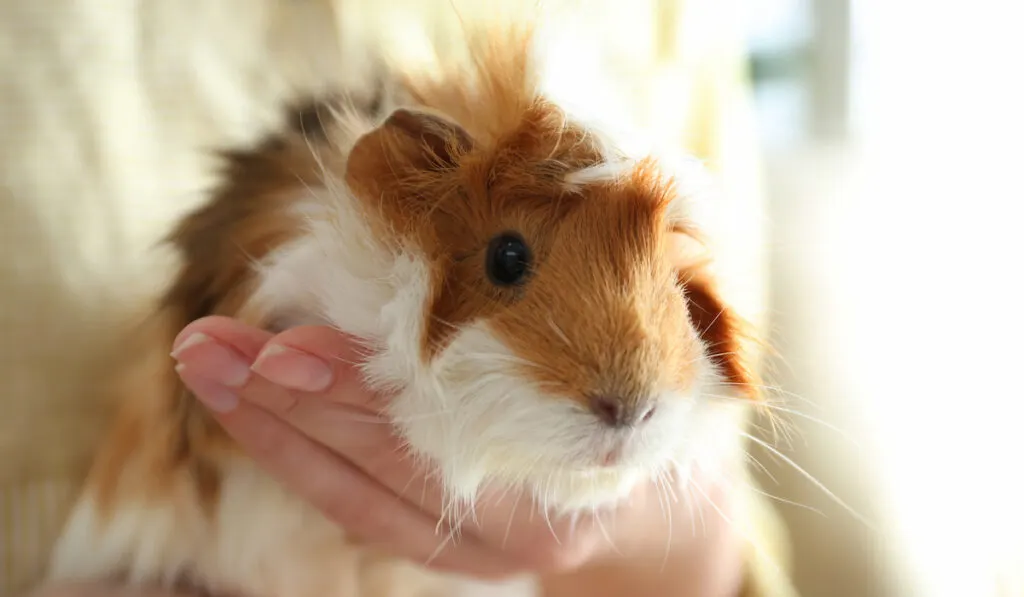As a responsible parent to your pet guinea pig, it might be a constant source of worry to you that your pet makes all these purring and vibrating noises. Are they happy? Are they troubled? Are they trying to communicate? These and many more questions will be answered in this article.
Experienced guinea pig owners know that guinea pigs purr and vibrate for several reasons, even when they are excited.
Some owners, however, are not experienced enough to tell apart and interpret the sounds and actions of their pet guinea pigs. Read on for a better understanding and tips on how to handle different situations when your pet is purring or vibrating.

Table of Contents
Do Guinea Pigs Purr?
Guinea pigs purr, and they make sounds similar to those of cats.
However, unlike cats, guinea pigs purr when they are happy, calm, and relaxed. This is often substantiated by the guinea pig’s relaxed posture with its head down, a sign of happiness.
However, the guinea pig’s purring pitch can at times be heightened with intense vibrations.
In such situations, notice if the guinea pig’s body is held rigid. This is often a sign of discomfort, such as fear, anger, or stress. You should find and neutralize the source of threat in the immediate environment or take the guinea pig to the vet if the signals persist.
Do Guinea Pigs Vibrate?
Yes, guinea pigs vibrate, mainly as a form of communication. They display their feelings by being cozy and making deep vibrating noises in their throat whenever they feel cheerful. They can, however, make the vibrations but appear utterly withdrawn, and this should make be a source of worry.
Guinea pig owners know that their little friends vibrate often, where a junior parent might get scared for the safety of the animal when it is actually fine.
However, mastering the art of reading your guinea pig’s signals is a skill that one learns over time and from observing the guinea pig’s environment. Therefore, take the time to check the surroundings for any cause of alarm to help you respond better.

6 Reasons Why Guinea Pigs Vibrate
Guinea pigs often vibrate depending on the environment they are in.
If it is a peaceful and cozy surrounding, they will feel relaxed and make vibrating sounds. But they can make vibrating sounds also to sound an alarm.
You just need to have a closer look at the guinea pig to interpret their feelings.
Let’s have a detailed look at what vibrating signifies for the guinea pigs.
1. They Are Happy or Calm
You might notice that your guinea pig makes the vibrating sounds whenever you give it a gentle pat on the back. The vibrations and occasional purr or tweeting sounds are indications of a calm and pleasant mood, and probably that the little furry friend is enjoying the cozy time.
2. Fear
Vibration for guinea pigs could mean that they are anxious and scared.
In such a case, the intense vibrations are often accompanied by clipped rapid sounds that are often high-pitched. To help them relax, find the source of discomfort and banish it immediately.
3. Frustration
If a guinea pig is irked by your actions or something around, they might make deep vibrations while gritting on their teeth to announce their feelings.
Among other guinea pigs, a male guinea pig will always make the vibrations to mark his territory and stress his dominance.
4. Pain or Sickness
If you notice your guinea pig shakes and vibrates immediately after you pick him up and are generally withdrawn, there might be a possibility that your pet is uncomfortable from an underlying pain or complication.
If the guinea pig further exhibits intense vibrations with violent shaking, it is best to take the pet to the vet.
Other symptoms of sickness include wheezing, diarrhea, hair loss, coughing, and the production of a thick discharge from either the eyes, ears, or mouth. Whenever any of these happens, quickly visit a vet to avoid things from quickly escalating out of hand, as guinea pigs are quite fragile.
5. Response to Cold
Just as humans shiver when it’s cold, guinea pigs also respond in the same way to cold. Guinea pigs can withstand heat, but often find it hard to combat the cold, making them shiver.
Fearful vibrations can also come about after taking a bath. For this, properly drying the guinea pig with a clean towel is necessary. Furthermore, you should shield them from cold air after giving them a bath.

6. When Seeking to Mate
Male guinea pigs often make low vibration sound to woo females to their mating advances. In response, the females will also make similar low-pitched sounds and follow the males to signify their interest. This, among other signs like cozying up and swinging their hips sideways, are signs that the mating season is here, and the guinea pigs are fine when they make vibrating sounds.
Besides, male guinea pigs often make the vibration sounds to mark their territory and make their dominance well known in the cluster.
Are Guinea Pigs Temperature Sensitive?
As aforementioned, guinea pigs are sensitive to cold, and will often shiver when exposed to cold, like after a bath. The intense shivers are often followed by small tweeting sounds, signifying cold. However, this is remedied by a nice drying session with a towel and further wrapping in dry towels.
On the other hand, guinea pigs can catch cold while in their cages.
Guinea pigs prefer a temperature of between 64-73°F.
With the proper environment, guinea pigs can keep a healthy body temperature but when the temperature drops, they might get too cold and will start shivering and can even at times vocalize how cold they feel.
However, this doesn’t mean that you can take your guinea pig and leave it out in the sunlight for too long. Guinea pigs do not have any cooling mechanisms, so leaving them out in the sun would lead to heatstroke and they may die.
How to Find Out Why Your Guinea Pig Is Vibrating
Depending on the situation and how the guinea pig reacts when shivering, it is crucial to know what triggered the vibrations, especially if the vibrations and the accompanying sounds signify something negative.
No matter the source of the problem, the RAC (Reaction, Antecedent, and Conclusion) method is useful for solving such kinds of problems through an analysis that collects, relates, and gives informed conclusions on why your guinea pig might be reacting strangely.
There is a breakdown of the method;
- R – Stands for Reaction. This is the stage where you assess the situation to identify the trigger of the reaction. Was the shivering accompanied by high-pitched sounds? This and more relevant questions will help you figure it out. It might be something to do with the guinea pig, or a different trigger within the immediate surroundings.
- A – Stands for Antecedent. This is where you put yourself in the guinea pig’s shoes and try to determine what happened before the guinea pig began vibrating.
- C – Standing for Conclusion. This is the stage where you make the necessary corrections to sort the issue based on the facts gathered from the first two stages.

How to Stop Your Guinea Pig from Vibrating
In normal circumstances, you don’t need to put in any measure to stop your guinea pig from vibrating. However, if you identified an external trigger causing discomfort to the guinea pig, here are a few ways to stop it;
1. Reduce the Amount of Environmental Stimulation
If your guinea pig often vibrates as a result of getting irked from the surrounding environment, such as in noisy places, you should reduce device volumes, such as TV, or move the guinea pig to somewhere more peaceful and quiet.
2. Add More Hideouts
Since different guinea pigs have different personalities, some might just feel safer with a cozy hideout that has room for it to burrow and hide in.
3. Contact a Vet
If there is an underlying illness, your pet can display fearful vibrations. If your pet also shows symptoms and often shivers and vibrates at random times, you should pay a visit to the vet for an examination of your little furry friend. Better to diagnose and prevent before disaster sets in.
Conclusion
Purrs and vibrations are a normal way of communication with guinea pigs. Although it might at first get confusing and overwhelming, you will master how to interpret their signals with time.
Just be sure to provide them with a peaceful environment, and listen to them more, especially if they want to be alone. With all things kept constant, the purrs and vibrations your guinea pig will make will mostly be those of the happy kind.
Resources
- https://peteducate.com/why-do-guinea-pigs-vibrate/
- https://animal-club.co.uk/why-do-guinea-pigs-vibrate/
- https://animals.mom.com/guinea-pig-noises-mean-1935.html
- https://mypetguineapig.com/guinea-pig-vibrating/
- https://thepetsupplyguy.com/guinea-pigs-vibrate/
- https://squeaksscalesandtails.com/reasons-why-guinea-pigs-shiver/
- https://petkeen.com/why-is-my-guinea-pig-shaking/
